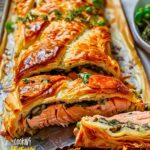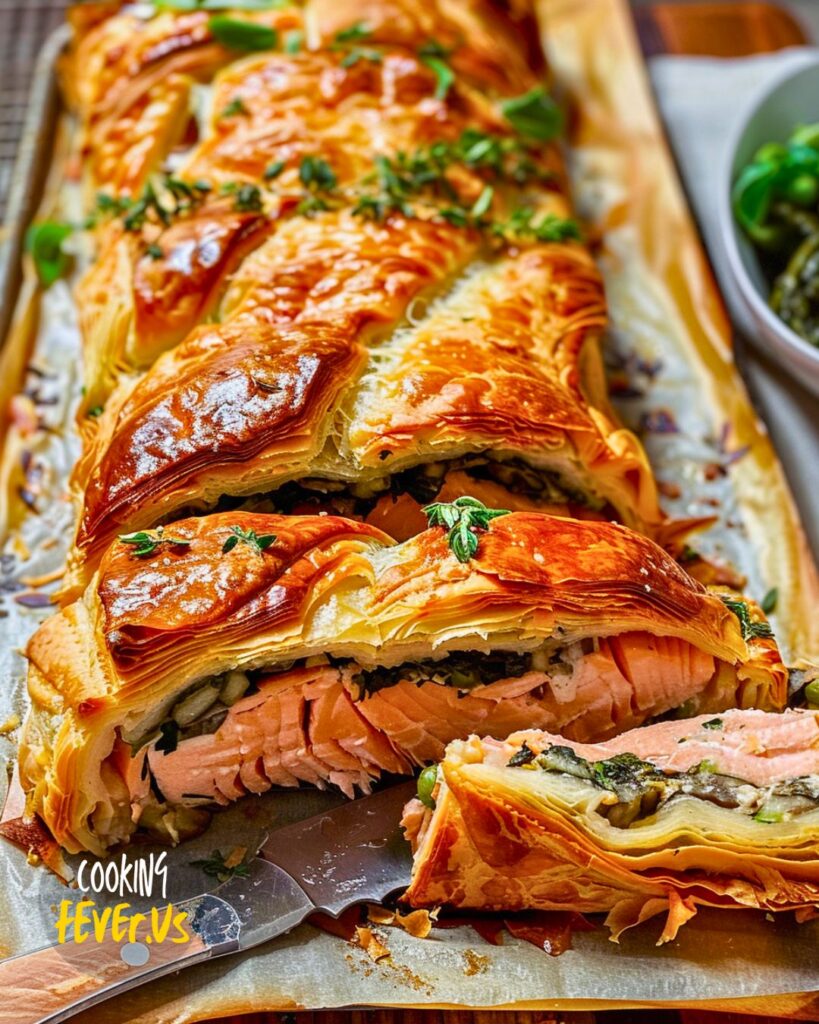Hey there, fellow food enthusiasts! I’m excited to share with you one of my all-time favorite recipes – Salmon Wellington. This dish is a delightful fusion of rich flavors and elegant presentation, perfect for impressing guests at a dinner party or simply treating yourself to a gourmet meal at home. My first encounter with Salmon Wellington was during a family vacation in the Pacific Northwest. We stumbled upon a charming little bistro nestled in the heart of Seattle, where the chef prepared the most mouthwatering version of this classic dish. I was instantly hooked and knew I had to recreate it at home.
What I love about this recipe is its versatility. While the traditional ingredients create a harmonious blend of tastes, there’s plenty of room for personal tweaks. Sometimes, I like to add a layer of sautéed mushrooms or even a hint of Dijon mustard to the spinach mixture for an extra depth of flavor. The puff pastry encases the salmon and spinach in a golden, flaky crust, making every bite a symphony of textures and tastes.
Whether you’re a seasoned cook or a kitchen newbie, this Salmon Wellington recipe is straightforward and rewarding. So, roll up your sleeves, preheat that oven, and let’s get cooking! Trust me, your family and friends will be singing your praises with this delectable dish on the table.
Making Salmon Wellington
Click here to get printable version
Ingredients
- 28 ounces boneless, skinless salmon
- 1 teaspoon dried dill
- 1 teaspoon lemon juice
- 1 zest lemon
- 1/2 teaspoon pepper
- 2 cups spinach (frozen)
- 1 egg yolk (whisked)
- 3 minced garlic cloves
- 1/2 teaspoon salt
- 2 teaspoons salt
- 1 small chopped yellow onion
- 13 ounces puff pastry
- 1 cup softened cream cheese
- 1 finely chopped bunch of dill
Directions
- Preheat the oven to 400°F.
- Season the salmon with dried dill, salt, and pepper, and set it aside.
- Sauté the chopped onion and minced garlic in a pan until soft. Add the frozen spinach and cook until warmed. Season with 2 teaspoons of salt and remove from heat.
- Mix the cooled spinach mixture with fresh dill, softened cream cheese, lemon zest, and lemon juice in a bowl until thoroughly combined.
- Roll out the puff pastry on a lightly floured surface to a thickness of about 1/4 inch. Cut it into a rectangle large enough to fully wrap the salmon fillet.
- Spread the spinach and cream cheese mixture in the center of the puff pastry, leaving about an inch of border on all sides. Place the seasoned salmon fillet on top.
- Fold the pastry over the salmon, sealing the edges with the whisked egg yolk. Press the edges with a fork to ensure a tight seal. Brush the top with the remaining egg yolk.
- Place the wrapped salmon on a parchment-lined baking sheet.
- Bake for 25-30 minutes or until the pastry is golden brown and the salmon is fully cooked.
- Let it rest for a few minutes before slicing and serving.
FAQs:
Can I use fresh spinach instead of frozen spinach for Salmon Wellington?
Yes, you can use fresh spinach. However, you need to cook it down to remove excess moisture before mixing it with the other ingredients. This helps to prevent the puff pastry from becoming soggy.
What is the best way to seal the puff pastry?
To ensure the puff pastry seals properly, brush the edges with the beaten egg yolk and press firmly with a fork. This helps create a tight seal, preventing the filling from leaking during baking.
How do I know when the salmon is cooked through?
The salmon is cooked when it reaches an internal temperature of 145°F (63°C). Additionally, the puff pastry should be golden brown. If you’re unsure, you can gently cut into the pastry to check the doneness of the salmon.
Can I prepare Salmon Wellington ahead of time?
Yes, you can prepare it a few hours in advance and refrigerate it until you’re ready to bake. Just make sure to keep it covered to prevent the pastry from drying out. Bake it straight from the fridge, but you might need to add a few extra minutes to the baking time.
What side dishes pair well with Salmon Wellington?
Salmon Wellington pairs well with roasted vegetables, a fresh green salad, or mashed potatoes. Additionally, a light lemon or dill sauce can complement the flavors nicely.
Can I use a different type of fish for this recipe?
While salmon is traditional, you can substitute it with other types of fish like cod or halibut. Just ensure the fish fillet is of similar thickness so it cooks evenly with the puff pastry.

Salmon Wellington
Ingredients
- 1/2 teaspoon salt
- 3 cloves garlic minced
- 1 teaspoon dill dried
- 2 teaspoons salt
- 28 ounces salmon skinless and boneless
- 1 bunch dill finely chopped
- 13 ounces puff pastry
- 1 egg yolk whisked
- 2 cups frozen spinach
- 1 small yellow onion chopped
- 1/2 teaspoon pepper
- 1 zest lemon
- 1 cup cream cheese softened
- 1 teaspoon lemon juice
Instructions
- Preheat your oven to 400°F.
- Season the salmon fillet with salt, pepper, and dried dill. Set aside.
- In a pan, sauté the chopped onion and minced garlic until they soften. Add the frozen spinach and cook until heated through. Season with 2 teaspoons of salt and remove from heat.
- In a mixing bowl, combine the cooled spinach mixture with fresh dill, cream cheese, lemon zest, and lemon juice. Mix until well combined.
- On a lightly floured surface, roll out the puff pastry to about 1/4 inch thickness. Cut the pastry into a rectangle large enough to enclose the salmon fillet completely.
- Spread the spinach and cream cheese mixture onto the center of the pastry, leaving about an inch of pastry on all sides. Place the seasoned salmon fillet on top of the spinach mixture.
- Carefully fold the pastry over the salmon, sealing the edges with the beaten egg yolk. Use a fork to press down on the edges to ensure a tight seal. Brush the top of the pastry with the remaining egg yolk.
- Place the wrapped salmon on a baking sheet lined with parchment paper.
- Bake for 25-30 minutes or until the pastry is golden brown and the salmon is cooked through.
- Remove from the oven and let it rest for a few minutes before slicing and serving.

